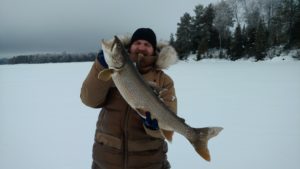Winter Camping and Lake Trout
The Boundary Waters is home one of the largest concentration of native Lake Trout lakes in the United States and the winter is one the best times to target them. As many summer canoe guest know Lake Trout spend their summers in deep water. This is because Lake Trout are a true cold water fish species that require cold and well oxygenated water to survive. This can make Lake Trout tough to catch on your August canoe trip, but it mean they are active and feeding heavily all winter long. Lakes entirely within the BWCAW open to winter trout fishing in early January with Lakes outside or partially outside the BWCAW opening roughly two weeks later. Similar to summer fishing often times anglers can find the best fishing by traveling farther than other fisherman to find less pressured fish. This often means camping and in the winter the challenges of this activity make for a grand adventure.
Unlike the summer Lake Trout can be found in just about any depth of water. I have caught them through the ice in as little as 12 feet of water or as deep as 70 feet of water. The structure you find fish on will vary from lake to lake although they usually prefer to be near reefs, steep drops, inside bends and saddles. Often fishing a transition zone where a steep drop begins to tapper into deeper water can be a great spot.
Lake Trout lakes in the BWCAW can be divided into two categories; those that have a deep water prey species like Cisco and those that do not. Expect lakes with Cisco or Smelt to have the potential to hold larger fish, but generally fewer fish. In comparison in many lakes without a deepwater forage species trout spend a large part of their year eating invertebrates. This results in them growing much slower, but in my opinion tasting much better. As a comparison lakes with a good forage base will have trout averaging 3 or 4 pounds when they reach sexual maturity around 7 years of age and lakes with invertebrate based forage will have these same age fish averaging around a pound. In general expect trout in lakes with a Cisco based forage to be in deeper water most of the winter than lakes without Cisco. When fishing lakes with large fish present please practice selective harvest. Lake trout are a slow growing species and their numbers are relatively low, either releasing all fish or keeping one smaller fish for dinner.
If you do choose to take a Boundary Waters trip chasing winter Lake Trout be sure you are prepared to stay warm and dry. Proper food, hydration, clothing, sleeping system and shelters are a must. A canvas tent with a wood stove, also known as a hot tent (we rent snow trekker tents) will make the trip much more comfortable. It will allow you to dry your gear and get a break from the weather. The other huge benefit of these tents is that they create a great place to hang out and enjoy a meal after a day of fishing. A hot tent with a well stoked wood stove can reach 70 degrees even in the coldest of nights. Winter nights in the wilderness are a magical time, viewing the stars and experience the true quite that only winter brings will make the trip a success with or without trout.
Finally don’t overlook how you will travel to and from you fishing destinations. Both snowshoes and ski are great options, as are Hok Skis which offer a compromise between the two. Pulk sleds or toboggans are a must for hauling gear in the winter. Be sure to know the conditions you are expecting and be prepared to travel in deep snow or slush at times. On a well packed trail you may able to travel 2 miles per hour, but it is also possible to have difficult conditions that result in traveling less than ½ mile per hour. For this reason I recommend that those new to winter travel in the Boundary Waters set realistic expectations and plan shorter routes for their first few trips until they are confident that they have the skill set to stay warm and an understanding of the unknowns of winter travel. Working with an outfitter will help you to know what routes are most often traveled and where you can expect to find trails that have already been packed by previous groups.
If you have always dreamed of heading into the Boundary Waters for a winter trout fishing adventure give us a call. We love winter and can help you plan for a successful and memorable adventure.


